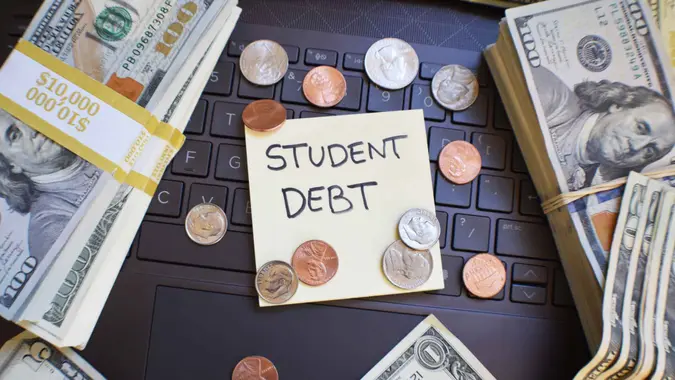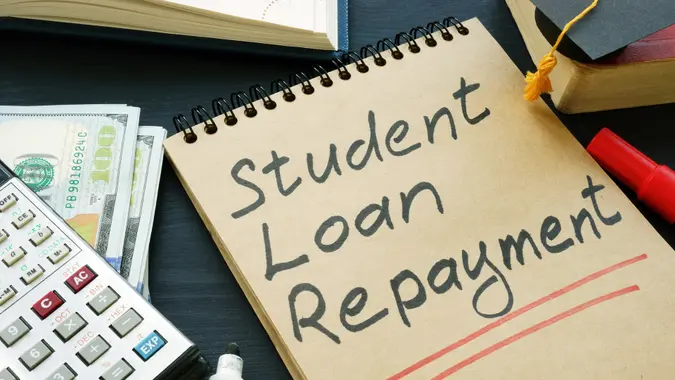Student Loan Debt: 3 Controversial Repayment Strategies If You Make Under $100K

Commitment to Our Readers
GOBankingRates' editorial team is committed to bringing you unbiased reviews and information. We use data-driven methodologies to evaluate financial products and services - our reviews and ratings are not influenced by advertisers. You can read more about our editorial guidelines and our products and services review methodology.

20 Years
Helping You Live Richer

Reviewed
by Experts

Trusted by
Millions of Readers
Some college graduates leave school thinking their degree will command a six-figure salary almost immediately or after just a few years of work experience in their field. However, that’s not typically the case.
One survey of recent college graduates revealed that students would not accept a starting salary less than $72,580 for their first job out of college, based on research by Real Estate Witch, powered by Clever. However, research showed that the average starting salary was just $55,911 in 2023.
The less money you make, of course, the harder it can be to pay off your student loan debt.
Student loan debt can impact every aspect of your financial life. Of the adults polled by Civicscience, 58% have concerns about paying off their student loan debt. More than one-quarter (26%) said they are “very concerned,” while 32% are “somewhat concerned.” Only 41% of Americans polled said they have no concerns about paying their student loans.
Of the adults polled by Civicscience who make between $50,000 and $100,000 per year, 65% said that their student loan payments affect their ability to save for retirement. Twenty-eight percent said they are unable to save any money for retirement because of their student loan payments, while 37% said their loan payments affect how much they are able to save but does not completely prevent them from saving for retirement.
Fortunately, programs exist for people making less than $100,000 to pay off their student loan debt and even enjoy some level of debt forgiveness. “Statistically speaking, just over 70% of all federal loan borrowers benefit financially from federal programs,” said Bobby Matson, founder of Payitoff, a service that provides consumer debt guidance solutions to financial institutions, enabling their customers to pay off all kinds of debt, including student loans, faster.
“The majority of student loan borrowers need to evaluate their options before deciding on the best payment strategy for them,” Matson told GOBankingRates.
In general, if you are a single person earning more than $50,000 but just under $100,000, some unconventional loan repayment strategies may work for your lifestyle. On the other hand, if you have a family and earn within that range, you may want to look at government programs for loan repayment strategies.
Aggressive Repayment
If you are single and have an income approaching $100,000, Matson recommended considering an aggressive repayment plan to save money on loan interest. “With a higher income, allocating extra payments towards the student loan principal can significantly reduce the interest paid over the life of the loan,” he said.
If you have a $60,000 loan balance with a 6% interest rate, putting an extra $200 toward that loan can save you $11,000 in interest and help you pay off your loan a full five years earlier.
You can then continue putting the loan payment funds toward your retirement savings or use it to pay down other debt. “Accelerating payments can lead to being debt-free faster, freeing up income for other financial goals,” Matson said.
However, it could mean cutting back on your retirement savings, or even putting those goals on hold, while you aggressively demolish your student debt.
Refinance Your Student Loans
Many people refinance their homes for a lower mortgage rate if their financial situation or the loan market changes. For instance, if your credit score has gone up since you purchased your home, and you’ve built up equity, you might be able to refinance at a lower interest rate even though the federal funds interest rate, a key factor in determining mortgage rates, is holding steady right now at more than 5%.
The same goes for student loan refinancing. “Refinancing can lead to lower interest rates, potentially saving thousands of dollars over the life of the loan. For example, refinancing $40,000 from 6.8% to 4.5% can save approximately $5,400 in interest over a 10-year term.,” Matson said.
If you have multiple student loans, consolidating into a single loan has other benefits, including simplifying loan management, reducing the chance you will miss a payment.
However, Matson warned, this tactic is not for everyone, “Refinancing typically requires good credit and stable income, which may be challenging for some borrowers,” he said.
Additionally, be cautious about refinancing federal loans into private loans, as you’ll lose the possible benefits of an IDR plan or PSLF. However, if your income continues to rise above six figures, you may not qualify for these programs, anyway.
Income-Driven Repayment Plans
If you have a family or an exceptionally high loan balance as a single person, you may qualify for an Income-Driven Repayment (IDR) plan on a federal student loan.
“Typically, if your income is two times your overall federal student loan balance, you won’t benefit much from federal programs such as IDR. However, this is very dependent on your family situation as well as occupation and expected income fluctuations,” Matson explained.
“Family size and marital status play a significant role in the size of your payment on IDR, so there’s a substantial difference between someone making $75,000 who is single and childless and someone with a household income of $75,000 who is married with two kids.”
If you are struggling to pay off your student loan debt, even with a household income close to $100,000, Matson suggested an IDR to balance your household needs with manageable student loan payments.
Final Note
Of course, salary is just one factor when determining your best student loan repayment strategy. “The overall balance of the loan is also a critical factor–typically, a borrower with a federal student loan balance close to their AGI will benefit from IDR.,” Matson said.
The program that’s best for you will also depend heavily on your career field. “If you’re in a residency and have accrued a lot of student debt to get your medical degree, for instance, you will need to rely on Income-Driven Repayment for several years before your salary can reach a high enough level to consider refinancing or prepayment,” he said.
 Written by
Written by  Edited by
Edited by 























